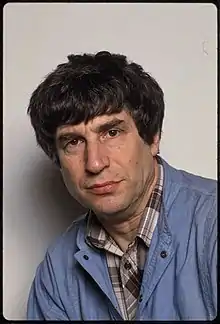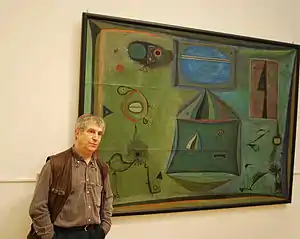Vladimir Yankilevsky
Vladimir Borisovich Yankilevsky (Russian: Владимир Борисович Янкилевский) (February 15, 1938 in Moscow[1][2] – January 4, 2018 in Paris[3][4]) was a Russian artist known mostly for his participation in the Soviet Nonconformist Art movement of the 1960s through the 1980s. Perhaps his most famous works are his triptychs, works that are difficult to classify, occupying a unique middle ground between painting, and sculpture, similar in some ways to Rauschenberg's combines. On the most basic level, these works use disorienting, often nightmarish imagery to paint a picture of restrictive mental states associated with daily life in the Soviet Union, and with the human condition in general.[5] He is also known for having participated in the Manezh Art Exhibit of 1962,[6] during which Nikita Khrushchev famously chastised the Nonconformist Art Movement as degenerate. Yankilevsky last lived in Paris,[7] France with his wife Rimma.

Bibliography
- Yankilevsky, Vladimir. The State Russian Museum Presents: Vladimir Yankilevsky. Moment of Eternity. (Exh. cat.). Yevgenia Petrova. St. Petersburg: Palace Editions, 2007. ISBN 978-3-938051-81-8 (International)
- The Experimental Group: Ilya Kabakov, Moscow Conceptualism, Soviet Avant-Gardes By Matthew Jesse Jackson
- Forbidden Art: The Postwar Russian Avant-garde, Art Center College of Design (Pasadena, Calif.), Gosudarstvennyĭ russkiĭ muzeĭ (Saint Petersburg, Russia), Curatorial Assistance, Incorporated, 1998 Original from the University of Michigan Digitized Nov 9, 2007 ISBN 1881616916, 9781881616917 Length 326 pages
References

- Владимир Янкилевский на сайте Музея АРТ4
- RKD.nl
- Умер художник Владимир Янкилевский
- Художник Владимир Янкилевский скончался в возрасте 79 лет
- Владимир Янкилевский в блоге Крокин галереи
- Jackson, Matthew Jesse (2010). The Experimental Group: Ilya Kabakov, Moscow Conceptualism, Soviet Avant-Gardes. University of Chicago Press. p. 48. ISBN 978-0226389417.
- Bortin, Meg (30 January 1999). "Russian Nonconformists Brave the West". International Herald Tribune – via HighBeam Research (subscription required) . Archived from the original on 21 September 2014. Retrieved 10 September 2014.